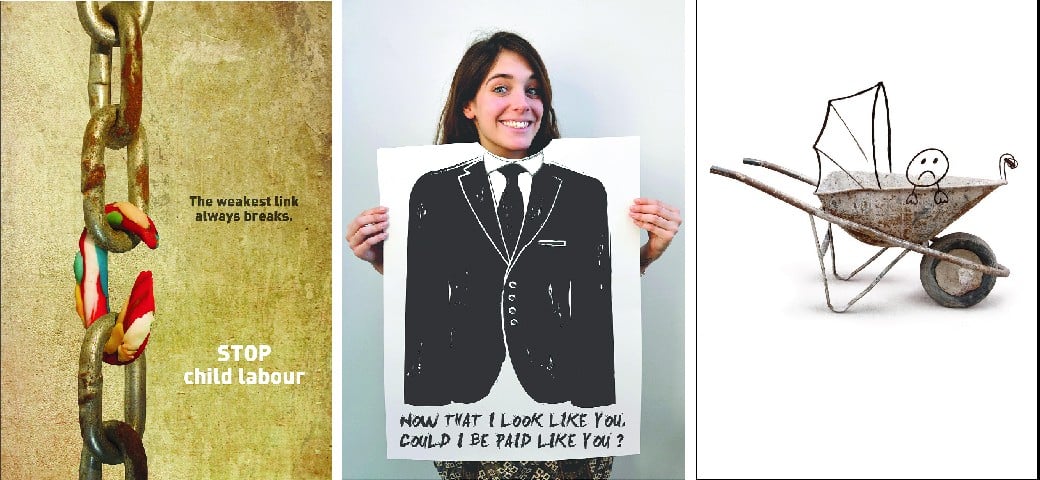
A contest, Poster 4 Tomorrow, that has turned into a movement

"Work is Worship" is a famous aphorism that we have been familiar with, but how many of us ponder about "Work Right!" -- the subject of this year’s Poster 4 Tomorrow, an independent, non-profit organization, promoting human rights issues through graphic design.
Poster 4 Tomorrow was started in 2009 in Paris, France, and each year, 100 best posters are selected to be displayed around the globe. The statement below by the organisers and participants of Poster 4 Tomorrow amply voices the objective behind the various annual themes:
"We are men and women around the world who believe that a poster, a simple, arresting image combined by a powerful piece of text, can be a force for change. A poster that when posted on a wall or on the net can make somebody sit up and take notice of an injustice and inspire them to take action. And that’s what we hope to do - to try and stop injustice."
This year, 4,301 posters were received from 133 countries for "Work Right!" It is a large number indeed, and a proud moment for Pakistan as for the first time a poster designed by a Pakistani, Sara Nisar, titled "Understand the Difference", made it to the top 100 posters.
Sara is a young student of design at the Visual Arts Department, Karachi University.
Several other posters are also protesting against child labour. A few of my favourites within this sub theme are Lebanon’s Ascile Khoury’s "Incarcerated Childhood" -- a simple yet effective design of a cage in black with a bright red balloon stuck inside it. From Brazil, Cassios Gabardo presents "The Weakest Link" in the form of a close-up photo of some metal chain links with one link made in colourful plasticine which is broken. The text on the poster further reiterates: "The weakest link always breaks. Stop child labour".
"Baby Wheelbarrow" by Scott Gomez (Ecuador) is also an adept illustration combining a stroller and wheelbarrow. The gray poster "Child labour isn’t working" by Arbesu Nacho (Spain) has a pink rocking horse on it that is made out as a sewing machine. There is a heart wrenching "Untitled" poster by Gulce Yuksel (Turkey), showing the map of Africa made up of chocolate, with the text: "They never taste what they make. Most children between 5-16 age work on choco farms in Africa".
American clinical psychologist and writer Kay Redfield Jamison rightly says that "Children need the freedom and time to play. Play is not a luxury. Play is a necessity."
Children’s exploitation by pushing underage girls into the business of prostitution is rendered in compelling ways in two posters. One is by Tuwanon Piyannuttapool of Thailand showing a photograph of a young girl huddling in a corner with a demeaning "New Arrival" flight tag with a bar code hiding her face, and the other is by Ricardo Garla of Brazil that shows, in the form of an outline of neon lights, the figure of a dancing girl who looks like she is barely 6 or 7 years of age; with the words ‘Live Girls’ emblazoned at the bottom. Both these images succeed in invoking revolt and sadness for the victims.
Women are victims of lesser pay than their male counterparts. This subtheme has also been portrayed in a few posters, but in general, it is the burden of overwork that many of the designers have depicted. For example, there’s one showing a man’s head inside a mince meat press, with bank notes coming out at the other end; designed by Marco Toxico of Bolivia. Another, designed by Munevver Sevim of Turkey illustrates an open wrench, and men filing into it one by one -- a depiction of the hard work that people put in at their jobs to earn a bit of money for survival. "Now hiring!" by Gus Morainslie of Mexico is also a brilliant take on this subject.
Artist and human rights activist Khuda Bux Abro has been single-handedly putting up the poster exhibition in Karachi for the past four years with support from the Human Rights Commission of Pakistan (HRCP) and the Arts Council of Pakistan, Karachi, where the "Work Right!" posters were displayed from December 5 to 7.
Renowned journalist and social activist Zubeida Mustafa inaugurated the show. Addressing the visitors, she congratulated Sara Nisar on her feat and reminded the audience of Article 23 of the United Nations Declaration of Human Rights (UNDHR) that "everyone has the right to work, to free choice of employment, to just and favourable conditions of work and to protection against unemployment".
As we know, that particular article has more clauses, such as "everyone, without any discrimination, has the right to equal pay for equal work. Everyone who works has the right to just and favourable remuneration ensuring for himself and his family an existence worthy of human dignity, and supplemented, if necessary, by other means of social protection" and that "everyone has the right to form and to join trade unions for the protection of his interests". She also mentioned the high rate of youth unemployment, and stressed on the dignity of labour, saying that both economic and social rights are equally important.